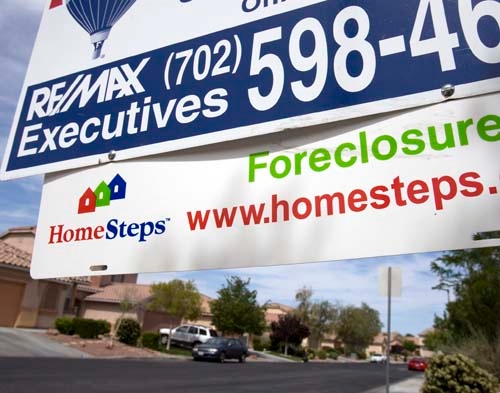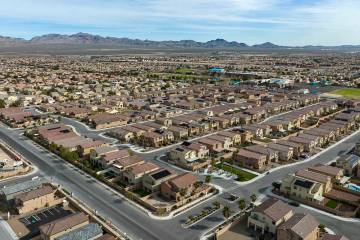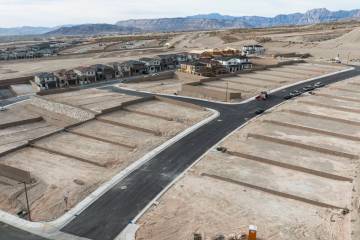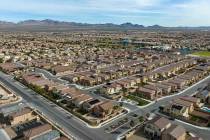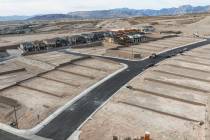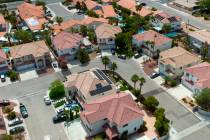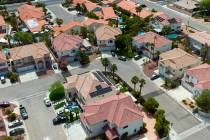Silver State has extra helping of bad debt to Freddie Mac, Fannie Mae
When Fannie Mae, one of two troubled government-backed mortgage-finance companies, guaranteed mortgage loans in Southern Nevada, homes were more expensive, and the average loan was worth 75 percent of the value of the home that secured it.
Now, after Southern Nevada values have plummeted nearly 60 percent in four years, the average loan is worth 129 percent of the value of the home. That's much deeper underwater than the national average loan, which is worth 74 percent of the home value, or in any other state. Average values in other stressed states range from 102 percent in Florida down to 75 percent in California, according to information from Fannie Mae.
Everybody has heard the sound bites: "When the mortgage bubble exploded, Nevada was ground zero!"
But clever phrasing oversimplified complex reality: Nevada has only its fair share of federally insured mortgage debt, but more than its share of that which has become delinquent. In the case of Freddie Mac, about four times its share.
The aforementioned figures reflect conditions specific to Nevada: the furious pace of the real estate boom and the precipitous fall in values that followed, greater reliance on subprime loans and more loans made to investors than elsewhere. And it also means that some of the solutions being proposed nationally would favor Nevada, more than others would.
As Southern Nevada home sales drop, unemployment climbs and banks refuse financing for the frugal and the frivolous alike. Developers, real estate agents, construction workers and others -- hurting for work and desperate for any catalyst to kick-start the housing market -- are watching as Congress prepares proposals for overhauling the Federal National Mortgage Association, known as Fannie Mae, and the Federal Home Loan Mortgage Corp., known as Freddie Mac.
The two government-sponsored enterprises own half of U.S. mortgages, or 31 million home loans worth $5 trillion. So far, the companies have received $135 billion in taxpayer bailouts from the federal government and have repaid $13 billion, according to the latest government projections.
The federal government on Thursday announced for the first time that the taxpayer bailout of Fannie Mae and Freddie Mac will cost between $142 billion and $259 billion depending on the direction of home values in the next few years. If values continue to fall, the companies won't recover as much from the sales of foreclosed properties. For perspective, the federal government bailouts of the financial companies, banks and automakers, combined, have cost taxpayers $50 billion, according to the U.S. Treasury's latest projections.
The debate in Congress, expected to be a major issue after next week's election, centers on how many taxpayer dollars it is worth risking to make financing accessible to homeowners who would not qualify otherwise. Conventional wisdom is that if banks know Fannie Mae and Freddie Mac will guarantee their mortgage debt, lenders are more likely to authorize loans they might not otherwise.
"All options should be on the table when both sides of the aisle come together to reform Fannie Mae and Freddie Mac," Sen. John Ensign, R-Nev., said in a statement. "It is important to me that we work to repair the broken housing market so that the economy in Nevada begins to recover and struggling people across our state get back to work."
In Nevada, where home construction for years had been the second largest industry, Fannie Mae and Freddie Mac own a combined $54 billion in mortgage loans, and $9 billion worth of those loans were delinquent as of June 30, according to the agencies' latest quarterly reports to the Securities and Exchange Commission and discussions with staff members at the Federal Housing Finance Agency, which regulates both companies.
Meanwhile, the government-sponsored enterprises combined in Nevada had an inventory of foreclosed homes worth $749 million on June 30 and credit losses of $669 million attributable to the nose dive in home values.
"This is a critical issue that impacts a large sector in our economy," Rep. Dina Titus, D-Las Vegas, said in a statement, "and we must be sure to thoroughly review all of the options and assess the consequences they could have on our economy."
Local real estate agents and developers are worried Congress might "overcorrect" in fixing the financial woes at Fannie Mae and Freddie Mac. If the reforms don't make it easier for prospective homebuyers to get a loan, homes sales will continue to languish and values won't turn around as quickly, they say.
Wayne Laska, owner of Storybook Homes in Las Vegas and a member of the Southern Nevada Home Builders Association, said his company has sold about 80 homes in the past year, and only two involved a traditional, 30-year mortgage, in part because homeowners aren't qualifying for loans. Most transactions involved cash, suggesting investors bought the homes, Laska said.
"I am afraid that they (Congress) are going to overcorrect, and put in place policies to fix what has happened in the last four years when all they have to do is go back and make the rules the way they were 11 years ago," Laska said.
Meanwhile, Bill Uffelman, president of the Nevada Bankers Association, said local bankers are concerned that the government not repeat past mistakes by making home financing too easy to obtain. For instance, developers offering financing with $10,000 down and lenders offering piggyback loans and adjustable-rate mortgages, helped set the stage for the foreclosure crisis.
"Everybody became enablers of the process," Uffelman said. "A lot of people with 100 percent financing jumped in, whether they planned to live in (a house), or were going to flip it and make a fortune ... . The problem with Vegas is that it is a town where everybody (thinks they are) going to get rich."
$9 BILLION IN DELINQUENT LOANS
The $54 billion Nevadans owe to Fannie Mae and Freddie Mac represents little more than 1 percent of the unpaid principal on mortgages the two government-sponsored enterprises, or GSEs, own across the country; which is comparable to Nevada's population.
But $9 billion worth of those loans -- nearly 17 percent -- are delinquent, according to quarterly data from the home-mortgage insurance agencies. And that's more than our share. For Freddie Mac alone $3.5 billion worth of delinquent debt in Nevada represents about 4 percent of its delinquent debt nationally.
The higher rate of delinquencies is because of the "irrational exuberance" of developers who built too many homes in Southern Nevada from 2004 to 2006 to meet demand, said Lewis Spellman, finance professor at the University of Texas, Austin. As a result, home values dropped further than in other parts of the country, and homeowners walked away from mortgages that far exceeded the value of their homes, he said.
"It makes rational sense to walk away from the home and take the bankruptcy," Spellman said. "There is no reason to pay off $300,000 in debt when the home is worth $150,000."
Looking to the future, Spellman said, government efforts to increase demand for Nevada's excess housing supply have not worked well, and the only way to balance supply with demand might be to demolish homes.
Fannie Mae's delinquent debt in Nevada totaled more than $5.5 billion. However, the organization refused to divulge the amount of its delinquent debt nationally, or the percentage that Nevada's losses represent, because that is proprietary information, Fannie Mae spokesman Todd Davenport said.
Of the two agencies' combined $749 million worth of Nevada homes acquired through foreclosure as of June 30, Fannie Mae's statewide inventory was valued at $394 million and Freddie Mac's was valued at $355 million.
Because of a 57 percent free fall in Southern Nevada home values over the past four years, Fannie Mae owns homes in Nevada that experienced credit losses worth $434 million while Freddie Mac sustained credit losses in Nevada worth $235 million as of June 30, according to quarterly data from the two companies.
Late last month, Clark County assessor records showed that Fannie Mae owned 3,661 properties and that Freddie Mac owned 1,098 properties in Southern Nevada. A review of 25 properties listed for sale by Fannie Mae showed that the difference in value between the price last paid for a parcel years ago and the amount it is listed at presently range from a low of $20,000 to a high of $235,000.
The examination also showed that the average value lost between the previous purchase price and current list price was 43 percent of the last purchase price. The largest loss in value was 73 percent and the smallest loss was 17 percent. With 11 of the 25 parcels, the amount lost was 50 percent or more of the last purchase price. Four of those 11 properties lost more than 60 percent.
PAST MISTAKES, PRESENT WOES
When considering reforms aimed at lowering taxpayer risk for money lost on bad mortgages, some say past mistakes must not be repeated while others believe jump-starting the stagnant housing market is foremost for Nevada.
Some, such as the Nevada Realtors Association, want Fannie Mae and Freddie Mac to continue insuring mortgage loans worth up to 125 percent of Southern Nevada's median home price. Doing so would make mortgage financing easier to get from reluctant lenders, increase homes sales and put more construction workers back to building homes.
"We need the higher loan limits in Nevada, and I think we should be proactive and extend them," said Linda Rheinberger, president of the Nevada Realtors Association. "We are looking for less of a Band-Aid and more of a permanent solution, so that the loan limits are not subject to market cycles, and we don't have to keep coming back (to Congress) and asking for the same thing over and over again."
Rheinberger said it's essential that Congress enact indefinitely the higher loan limits it allowed Fannie Mae and Freddie Mac to guarantee only for another year while reforms are considered. Presently, loans are limited to 125 percent of a region's median home price with a cap of $729,750. However, legislation proposed -- partially in response to plummeting values nationwide -- would lower loan limits to 115 percent of local median home prices with a cap of $625,500.
Although Southern Nevada home prices have nose-dived, Rheinberger said, the higher values should be guaranteed because high-priced homes are not selling well and values across the valley will increase in time.
"We will eventually need the higher limits in Nevada ... and I think we should be proactive and extend them. We do have lower values (currently) ... but we do have homes for sale at that (higher) price," Rheinberger said.
Nationally, real estate agents say that without the higher loan limits, the average value lost on a home loan could be $50,000, and that the higher loan limits will afford more people the opportunity to live in higher-priced areas by making mortgage financing available to them.
According to the National Association of Realtors, "With tight underwriting constraining mortgage availability, lowering the FHA/Fannie/Freddie loan limits will only further restrict liquidity. Even with the current higher limits, borrowers are finding it more and more difficult to find affordable mortgage financing. Making the current limits permanent at levels appropriate in all parts of the country will provide homeowners and homebuyers with safe, affordable financing and help stabilize local housing markets."
With regard to protecting U.S. taxpayers, Rheinberger said that Fannie Mae and Freddie Mac should no longer be quasi-government agencies. Instead, a hybrid should be established that offers the bottom-line discipline of a corporation with the protections from bankruptcy of a government agency.
Bankers, on the other hand, are in favor of lower loan limits for Fannie Mae and Freddie Mac, in part because financing schemes -- such as adjustable rate mortgages and so-called 80-20 home loans -- were part of the problem that led to the mortgage crisis and should not be repeated by making financing too easy to obtain, said Uffelman, president of the Nevada Bankers Association.
At the end of the real estate boom in 2007, the state Mortgage Lending Division had 1,250 mortgage brokers and 10,600 licensed agents trying to get homebuyers the best mortgage rates in return for commissions. In response to the crippled housing market, coupled with new state regulations -- which require agents to have a surety bond and call on brokers to pay an employee tax for each agent -- the number of brokers dropped to 250, and the number of licensed agents to about 2,200.
Even though the foreclosure crisis, both nationally and in Southern Nevada, centered on home loans guaranteed in 2005 and 2006, Laska, owner of Storybook Homes, blames the foreclosure crisis on the Clinton administration for relaxing Fannie Mae's and Freddie Mac's lending requirements 11 years ago.
He said Clinton encouraged financing for low-income people who wouldn't have qualified for a home loan otherwise. Those loans went unpaid and contributed to the current housing crisis, he said. Laska claims the Clinton-era policies were simply on autopilot during the two-term Bush administration, even though that is when private sector interests competed for market share previously held by Fannie Mae and Freddie Mac.
"It was the Clinton administration that pushed for a loosening of the rules so that people who shouldn't have been buying homes were out there buying homes," Laska said.
But in Southern Nevada, specifically, the bigger problem wasn't low-income households getting loans they couldn't afford, Laska said. Instead, Fannie Mae and Freddie Mac were guaranteeing loans to investors, who simultaneously had financed several properties they no longer could afford when land values started downward.
County assessor records echo Laska. They show that nearly two-thirds of the single-family homes foreclosed on between 2007 and the first half of 2010 were not owner-occupied, meaning they most likely were investor-owned rentals.
Laska believes that if Congress rewinds its regulations back to the pre-Clinton era, everything will be fine for prospective homeowners. To qualify for financing, customers will need a credit rating of 680 and be required to put down 3 percent to 5 percent of the cost of the home.
Otherwise, Laska is worried lawmakers may go too far to correct mistakes that caused the housing crisis, and handicap the local market with what he believes might be unnecessary restrictions.
"My fear is that they are going to choke off the mortgage financing," Laska said.
Contact reporter Frank Geary at fgeary@reviewjournal.com or 702-383-0277.
RELATED STORIES
• Democrats, Republicans, differ on approach to mortgage firms
• A look at Nevada's contribution to the foreclosure crisis
• Fannie Mae and Freddie Mac losses in Nevada



